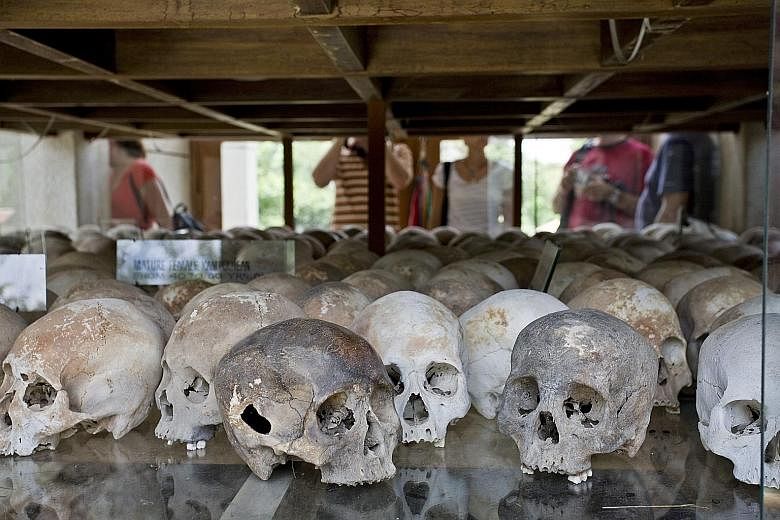BANGKOK • After spending more than a decade and nearly US$300 million (S$421 million), the United Nations-backed tribunal prosecuting the crimes of the Khmer Rouge has convicted just three men.
It appears now that they could be the only people to answer in court for the deaths of at least 1.7 million Cambodians from 1975 to 1979 in one of the worst episodes of mass killing in the last century.
Three more potential defendants have been investigated by the tribunal, an ungainly mix of Cambodian and international prosecutors and judges. The Khmer Rouge (Red Khmer) is the name given to the Communist Party of Kampuchea.
However, because of resistance on the Cambodian side, there are serious doubts that their indictments will proceed.
"From the start, the Cambodian government had a very different idea about how many people would be tried, and their view appears to be prevailing," said Professor Alexander Hinton, an anthropology professor at Rutgers University-Newark. "The court's legacy will be tainted and greatly diminished if it fails to try further cases."
The trials' slow pace and susceptibility to political interference are in part a result of an awkward compromise reached by Cambodia and the UN when they agreed to set up a combined international court, which formally began in 2006.
Questions about the tribunal's effectiveness and independence had also been raised from the start.
"From the perspective of truth and justice, a de facto show trial of a few senior political figures would almost be a worst-case scenario," Cambodia expert Stephen Heder, from the School of Oriental and African Studies in London, said in 2003 as plans for the tribunal were being put in place.
Of the three convicted, two were members of the highest circle of the radical communist regime: Nuon Chea, 90, who was No. 2 in the hierarchy, and Khieu Samphan, 85, the chief of state.
They were sentenced to life in prison for crimes against humanity, and are undergoing a separate trial for genocide and other crimes.
The third convict, Kaing Guek Eav, known as Duch, who commanded a notorious Khmer Rouge prison, was also sentenced to life in prison for crimes against humanity.
Cambodian Prime Minister Hun Sen has opposed further indictments, suggesting that an expanded trial would lead to civil war.
Former foreign minister Hor Namhong had also said when he held the post that further indictments "will not be allowed".
The Cambodian government includes several former members of the Khmer Rouge, including Mr Hun Sen, and has been seen to be careful to protect its own.
In addition to trying to limit the number of defendants, it has denied access to potential witnesses who now hold influential government positions.
The limited number of convictions is partly the result of the quarter-century of civil war and political turmoil that elapsed between the fall of the Khmer Rouge and the start of the trials.
Many potential defendants are no longer alive, including Pol Pot, the movement's chief, who died in 1998.
Two of the original five defendants also died before their trials were completed.
Journalist Thierry Cruvellier, who has covered most of the trials, said taking a decade to convict three men "is clearly not a great achievement", although the time and expense are modest by tribunal standards.
The war crimes trial for the Rwandan genocide lasted 20 years, produced 61 sentences and 14 acquittals, and cost between US$1 billion and US$2 billion.
Meanwhile, the tribunal for the former Yugoslavia is drawing to an end after 23 years, with a record of 83 convictions and 19 acquittals and a price tag estimated at more than US$2 billion.
NYTIMES

